|
|
This week in: Peace & Security Publications |
IPSI | Africa | Americas | East Asia | Middle East | South Asia
|
|
|
|
|
This week in Peace & Security Publications
|
|
|
|
|
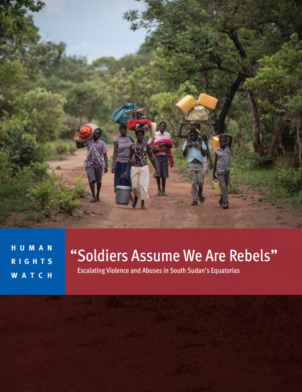
Human Rights Watch: In May 2017, Human Rights Watch researchers visited two refugee settlements in northern Uganda and interviewed over 100 South Sudanese refugees who fled from the Kajo Keji and Pajok areas, south and southeast of Juba, between January and May of this year. Their accounts of serious violations at the hands of government soldiers match the wider patterns of…
|
|
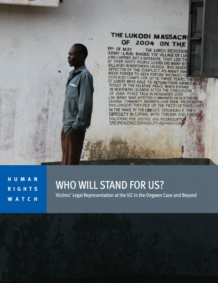
Human Rights Watch: Victim participation in proceedings before the International Criminal Court (ICC) is a central innovation in international justice: in addition to potentially being witnesses called by a party or the court, victims of crimes tried before the ICC may stand before the court as participants in their own right. This right of participation is not absolute. But it can nonetheless provide a key bridge between…
|
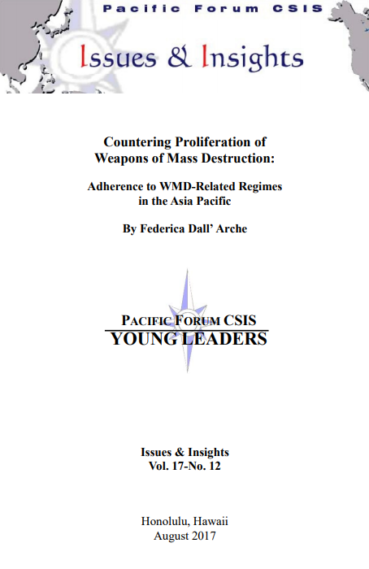
CSIS: This paper assesses the status of adherence to key instruments of the biological, chemical, and nuclear nonproliferation, security, and safety regimes in the Asia Pacific. This is timely given that chemical and biotechnology industries are rapidly…
|
|
|
|
|
|
|

Sarajevo Blogs! Experience the Sarajevo Symposium on Post-Conflict Transitions through the eyes of the participants in their daily blog!
|

Bologna Blogs! Learn more about Bologna Symposium by reading our blog written by participants from this summer!
|
|
|
|
|
|
|
This week in Sub-Saharan Africa
|
|
|
|
|
CAMEROON: Eight kidnapped and 11 dead in village raid
On Friday night, suspected Boko Haram militants killed 11 and kidnapped eight in Gakara, near the Nigerian border. The group opened fire towards people in the town leaving 30 wounded and burning at least 30 houses. Many fled to a camp near Kolofata that hosts thousands displaced by Boko Haram violence. Comment: 20,000 have died and 2.7 million have fled in the eight years of Boko Haram’s fight to establish an Islamic state in the Lake Chad region. (ChannelsTV, Reuters, AlJazeera)
|
|
|
|
|
|
SOMALIA: 10 killed in U.S. backed Somali raid
On Friday, Somali soldiers – along with U.S forces in a supporting role – raided a farm in the Barire village in the Lower Shabelle region as part of an offensive against the al-Qaeda affiliated al-Shabaab militia. Ten civilians, including three children, died in the raid. The U.S. backed the operation as part of its increased commitment to fight the extremist group al-Shabaab and is now conducting an assessment of the situation. Comment: Al Shabaab is fighting to overthrow the government and to impose Islamic law in Somalia. (SunaTimes 1, 2, AfricaCommand, AlJazeera, NYTimes)
|
|
|
|
|
SOUTH SUDAN: American journalist among the 19 killed in rebel fighting
On Saturday, journalist Christopher Allen was killed in fighting between rebels and the South Sudanese army along with 19 others in the town of Kaya near the Ugandan border. Sixteen rebels and two government forces were among the 19 dead. Allen was embedded with the South Sudanese rebels to report on the war. The South Sudanese government claims that Allen was not targeted, but that he was caught in the fight. The Sudan People’s Liberation Movement-in-Opposition argue Allen was targeted by government forces. Comment: Allen is the 11th journalist killed in South Sudan since 2012. Thousands have been killed in the ethnic civil war and millions have fled the country. (News24, AfricaNews, Time, BusinessInsider)
Researched/Written by Angelica Aimé Silfa
|
|
|
|
|
|
This week in the Americas & Caribbean
|
|
|
|
|
CHILE: Twenty-nine trucks burned in attack, no injuries reported
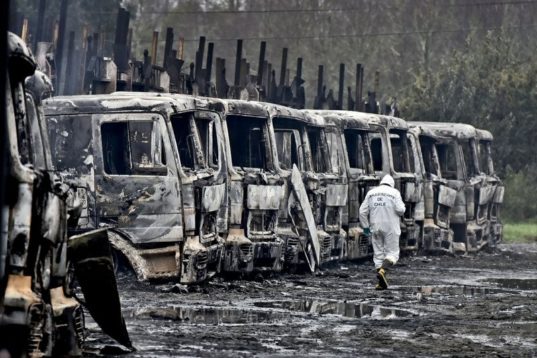 |
|
On Monday, a group of armed men hijacked and burned 29 logging trucks in the southern region of Los Rios, causing USD 6 million in damage. Authorities denounced what they described as a “terrorist attack” and convened an emergency meeting. Weichan Auka Mapu, a Mapuche armed group responsible for dozens of recent attacks in neighboring regions, is suspected due to pamphlets found onsite. Truck drivers warned against a national strike if the government does not begin a proper investigation. Comment: Weichan Auka Mapu was already linked to a similar attack on 18 trucks 10 days before, amid rising tensions in a years-long conflict with forestry companies. The Mapuche community is Chile’s most predominant indigenous community, with 600,000 living mainly south of Santiago. Radical factions are accused of burning houses, churches, trucks, and forest plantations, and police forces have been accused of violent abuses and discrimination during raids. (La Nación, El Dinamo, Reuters, The Associated Press)
|
|
|
|
|
|
GUATEMALA: Constitutional crisis looms as President demands anti-corruption official’s deportation
On Sunday, President Jimmy Morales ordered the deportation of the Head of the UN anti-corruption entity in Guatemala (CICIG) Iván Velásquez. This decision follows the Guatemalan attorney general’s request on Friday to strip Morales of his legal immunity so that he may answer corruption accusations regarding his 2015 campaign. Morales’ order, which was condemned by the UN and various countries, led to the resignation of eight high-level officials in protest and the removal of two others. It was quickly overruled by the Supreme Court, although Morales challenged the court’s jurisdiction in the matter. Anti-corruption street protests ensued, calling for Morales’ resignation. Comment: The CICIG, founded in 2006, is widely supported by the Guatemalan population due to the historic issue of corruption in the country. Eric Olsen from the Wilson Center in Washington described the current situation as a “constitutional crisis of the gravest proportions.” Specialists warn of the potential for large-scale demonstrations, particularly in Guatemala City, should Morales continue to push for Velásquez’s deportation. (Prensa Libre, El Nuevo Herald, Garda News, Reuters, The Associated Press)
|
|
|
|
|
|
REGIONAL: Venezuela reacts to new U.S. economic sanctions
|
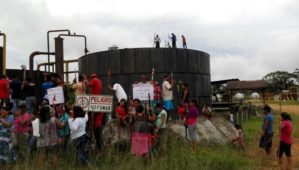 |
Friday’s increase in U.S. economic sanctions, described by Venezuela’s Foreign Minister as “the worst aggressions to the country in the last 200 years,” triggered a series of reactions from Venezuelan authorities. On Saturday, two Colombian radio stations were denied the renewal of their licenses for airing critical coverage of President Maduro’s government, and the country staged nationwide military exercises with civil militias to allegedly defend against a possible U.S. military intervention. On Tuesday, Venezuela’s National Constituent Assembly (ANC) passed a decree ordering its new “truth commission” to investigate Venezuelan “traitors” accused of supporting the U.S. sanctions. Maduro had previously singled out the opposition-controlled congress. Comment: Since it took office a month ago, the ANC has been described by many as ruling with virtually unlimited power. According to the Associated Press, the ANC’s Truth, Justice and Reparation Commission for Victims wields the unusual authority to subpoena and prosecute anyone suspected of wrongdoing. The ANC recently claimed the creation of a new “hate and intolerance” law proposed by Maduro designed to control the emission of messages that seek hatred, civil war, intolerance, confrontation and conflict. Any officials having directly or indirectly participated in “hate crimes” or unrest are susceptible to up to 25 years imprisonment. (The Associated Press, Reuters, TeleSur, BBC News)
Researched/Written by Nastasia Stipo
|
|
|
|
|
|
This week in East Asia & Pacific
|
|
|
|
|
JAPAN: North Korea fires mid-range ballistic missile over Japan
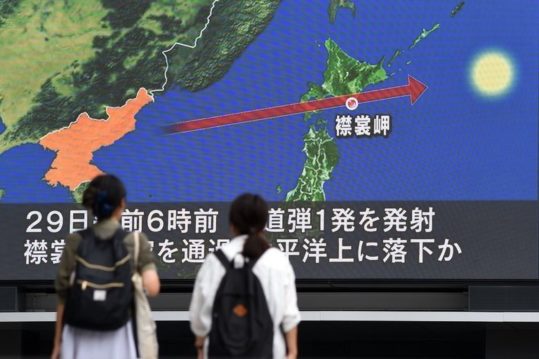 |
|
On Tuesday, North Korea fired an intermediate-range Hwasong-12 missile over Japan’s northern Hokkaido Island. The missile was launched from near Pyongyang before 06:00 hrs local , and passed over Japanese territory at 06:07 hrs, flying 2, 700 km and reaching an altitude of 550 km before plunging into the sea. In response to the missile test, the Japanese Defense Ministry requested a record budget of ¥5.26 trillion for the 2018 fiscal year. The proposed budget includes a request for a land based missile system called Aegis Ashore to defend against a ballistic missile attack from North Korea. Comment: In direct response to North Korea’s latest nuclear weapons test over Japan, South Korean and U.S. forces concluded their annual military war games Ulchi Freedom Guardian this week with aerial live-fire exercises on Thursday in eastern South Korea. Pyongyang regarded the annual war games as a joint U.S.-South Korean rehearsal for invasion and claimed that Tuesday’s launch over Japan was in response to this year’s war games. (Channel News Asia, Nikkei Asian Review, The Japan Times, Time)
|
|
|
|
|
|
MYANMAR: Clashes between militant and security forces in Rakhine State sparks mass exodus of Rohingya
On Friday, the Arakan Rohingya Salvation Army (ARSA) coordinated several attacks on police posts and a military base in Rakhine State leaving 110 people, including militants, security personnel, and civilians, dead as of Tuesday. According to reports from Myanmar State news, Myanmar security forces have launched “clearance operations” in the region due to the “coordinated attacks by extremist terrorists.” According to the International Organization of Migration (IOM), about 18,500 Rohingya have fled Myanmar to Bangladesh in the past week after the outbreak of violence. Rohingya refugees at the border have reported that security forces are destroying villages and firing on fleeing civilians. Comment: The attacks on Friday came shortly after the Advisory Commission on Rakhine State, led by former UN Secretary General Kofi Anan, delivered their final report to the Myanmar government. The report contained recommendations for addressing the ongoing instability of Rakhine State. (CNN, R2P, Reuters, Aljazeera)
|
|
|
|
|
|
PHILIPPINES: Funeral march of teenager slain in anti-drug raid becomes mass protest
|
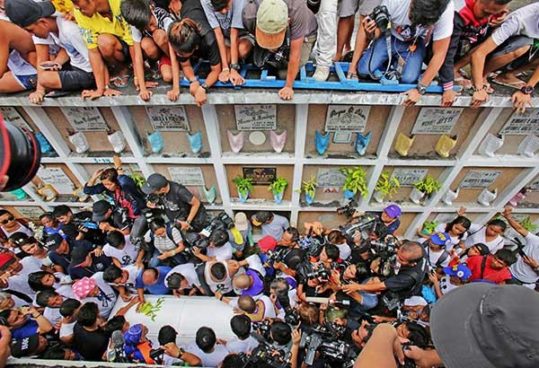 |
On Saturday, thousands in Quezon City joined the funeral procession of 17-year-old Kian Loyd Delos Santos calling for justice for the slain teenager and protest the violence of President Duterte’s nationwide war on drugs. The mourners-turned-protesters marched from Delos Santos’s home to the precinct of the three police officers involved in the boy’s death, shouting “Justice for Kian, Justice for all,” before continuing to the cemetery. President Détente has condemned and called for an investigation into Delos Santo’s death. After Delos Santos’ parent filed a criminal complaint on Friday, the three police officers involved in the boy’s death were charged with murder and torture of a minor. Comment: According to police reports, Kian Lloyd Delos Santos was shot by police for attacking police and resisting arrest in an anti-drug sting on August 16th. Reports from eyewitnesses and CCTV footage contradicted official reports and suggested that plainclothes police officers dragged Delos Santos into an alleyway and then shot him in the head. According to Jose Manuel Diokno, Filipino human rights lawyer and chairman of Free Legal Assistance Group, the protests mark a “significant” change in public mood, as “even the government is paying attention the reaction (to Delos Santos’ death). (The Philippine Star, Channel News Asia, Reuters, CNN)
Researched/Written by Laura Bisbee
|
|
|
|
|
|
This week in Europe & Central Asia
|
|
|
|
|
BELARUS/RUSSIAN FEDERATION: NATO to observe large-scale military exercises amidst suspicions and rising regional unease
 |
|
On Wednesday, NATO announced that it will send observers to the 2017 Zapad (West) military drills – to be conducted in Belarus and Russia in mid-September – and ensure that the exercises have no ulterior purposes. According to specific rules laid out by the Organization for Security and Cooperation in Europe (OSCE), states conducting such military games with more than 13,000 troops must notify other countries in the region and allow international observers. Russia and Belarus say less than that number will participate, but Western military officials believe that as many as 100,000 military personnel may be involved. NATO claims that Russia has fallen short in allowing the necessary transparency, and has never invited a NATO ally to observe any of their exercises. Comment: A top ranking U.S. Army official in Europe told Reuters that some in the region “worried the exercises could be a [Russian] ‘Trojan horse’ aimed at leaving behind military equipment” in Belarus as a precursor to an occupation- as has happened in the past in Georgia and Ukraine. Russia addressed these fears, claiming the exercises will purely be a rehearsal for defensive scenarios. (BelTA, TASS 1, 2, RFE/RL, Reuters 1, 2)
|
|
|
|
|
|
ESTONIA/RUSSIAN FEDERATION: Tensions escalate ahead of meeting of EU foreign ministers in Tallinn
|
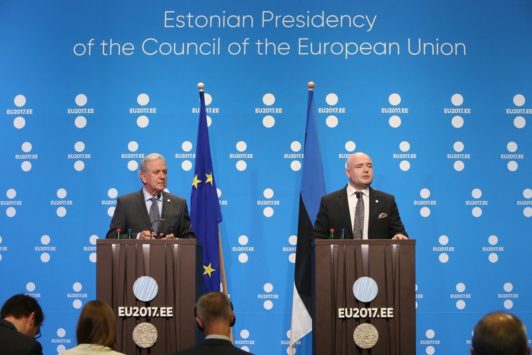 |
Tensions continue to rise this week as Estonia has refused to accredit three journalists working for Russian state news agency Rossiya Segodnya, therefore barring them from attending next weeks informal meeting of EU foreign ministers in Tallinn. While Russia has condemned the refusal, the Council of Europe supports Estonia’s right to ban reporters from events, particularly when certain channels, such as those in the Rossiya Segodnya group, are not considered independent. The September 7 meeting, which will include a strategic-level table-top cyber exercise for EU defense ministers, aims to highlight strategies and limitations of EU and NATO members against cyber attacks, as well as discuss defense cooperation and the European Defence Fund. Comment: Rossiya Segodnya is a Russian state firm that owns multiple online media agencies, including Sputnik, and has been called a “pseudo news agency” and “an enemy of journalism” by the European Parliament and Reporters Without Borders, respectively. (ERR 1, 2, Sputnik News, Xinhua, EU Observer)
|
|
|
|
|
|
UKRAINE: Crackdown on journalists continues despite OSCE condemnation
On Thursday, Ukrainian authorities announced that they had deported a Russian journalist and banned her from re-entering the country on account of alleged anti-Ukrainian bias in her reporting. The journalist, Anna Kurbatova, had reported on the persecution of journalists in Ukraine prior to being detained in Kyiv by the Security Service of Ukraine (SBU), and the Organization for Security and Co-operation in Europe (OSCE) Representative on Freedom of the Media denounced her treatment and expulsion. A few days before Kurbatova’s arrest, two Spanish journalists were prevented from entering the country. The SBU considered their reporting on a conflict with eastern separatists against national interests and false. Also on Wednesday, the SBU said in a statement on Facebook, “The same will happen to everybody who may take the liberty of defaming Ukraine.” Comment: The treatment of foreign and domestic journalists in Ukraine has been increasingly called into question in the last few years, and seven journalists have been killed in Ukraine since the conflict with Russia in 2014. According to Freedom House, press freedom in Ukraine is only “partly free.” (RFE/RL, Reuters, CPJ, Freedom House, OSCE)
Researched/Written by Natalie A. Landau
|
|
|
|
|
|
This week in the Middle East & North Africa
|
|
|
|
|
IRAQ: Iraqi operations against Islamic State enters final stage in Tal Afar
After retaking the northwestern town of Tal Afar on Sunday from the self-proclaimed Islamic State (IS), Iraqi forces are facing fierce resistance from remaining militants who fled Tal Afar to Al-Ayadiya town, a few miles north of Tal Afar. The battle for Al-Ayadiya has been described by Iraqi troops as “multiple times worse” than the battle for Mosul. Colonel Kareem al-Lami described the first stage of Al-Ayadiya battle as opening “the gates of hell.” Comment: Tal Afar’s pre-war population was more than 200,000. According to the UN, more than 30,000 civilians fled Tal Afar since April. Victory in Tal Afar leaves only two strongholds left in Iraq for IS – around Hawija, 170km to the south-east, and from Ana to Al-Qaim in the Euphrates river valley, 220km to the south. (Euronews, BBC, Reuters)
|
|
|
|
|
|
LEBANON: Lebanese authorities find the remains of soldiers kidnapped by self-proclaimed IS
On Sunday, the Lebanese army recovered 10 bodies along the Syrian borders after IS left their last stronghold in the area in a ceasefire deal. On Wednesday, the Lebanese authorities identified the remains of six Lebanese soldiers among the 10 bodies after doing DNA tests. Ten Lebanese soldiers were captured by ISIS in 2014 along the Lebanese-Syrian borders where ISIS held territory for years. Lebanese Army Chief General Joseph Aoun stated on Wednesday that the ceasefire deal included disclosing the locations of the Lebanese soldiers’ bodies by ISIS, “I had two choices: either I continue the battle and not know the soldiers’ fate, or I submit to the situation and find out. Their souls are my responsibility.” Comment: It remains unclear if all six bodies belonged to the soldiers captured in 2014. (Reuters, Almasry Alyoum, France24)
|
|
|
|
|
|
MOROCCO: Moroccan authorities arrested Barcelona attackers’ suspected suppliers
On Tuesday, Spain’s interior minister, Juan Ignacio Zoido, reported from Rabat, Morocco that Moroccan authorities had arrested two suspects linked to the Catalonia attacks in early August. Moroccan police arrested one of the suspects in the city of Casablanca and the other in the city of Oujda, according to Spanish news agency EFE. Comment: The two men are suspected of supplying gas canisters to a jihadist cell that carried out a double attack in Catalonia killing 16 people. (Morocco World News, Reuters, France24)
Researched/Written by Atika Alkhallouf
|
|
|
|
|
|
AFGHANISTAN: At least 11 civilians killed in U.S.-led airstrike
On Wednesday, at least 11 civilians were killed and 16 wounded by a NATO airstrike on a civilian house where Taliban insurgents had taken shelter in Logar Province. Despite the house owner’s plead to leave the home, the Taliban militants fired a rocket at a NATO helicopter, causing it to turn and strike the home. The NATO-led mission in Kabul did not confirm involvement. This attack took place days after an Afghan airstrike killed 13 civilians in Herat. Comment: According to the UN, there is a 43 percent increase in civilian casualties in the first half of 2017 caused by Afghan and U.S. airstrikes. (NDTV, Daily Mail, Reuters)
|
|
|
|
|
|
INDIA: Both India and China withdraw troops from Doklam plateau
On Monday, both India and China called for “expeditious disengagement” of troops on the Himalayan border of India, China, and Bhutan, after a 70-day standoff sparked by China’s decision to build a road through the disputed area. Media in both countries claimed victory. Comment: This withdrawal occurs just before a BRICS summit this weekend hosted by China. Analysts say withdrawal of troops does not increase trust towards between the nations. (Washington Post, Al Jazeera, Forbes, Reuters)
|
|
|
|
|
|
PAKISTAN: Resolution passed in response to U.S. South Asia policy
On Wednesday, the Pakistani Parliament passed a resolution to suspend supply lines to the U.S.-NATO mission in Afghanistan in response to President Trump and Secretary Tillerson’s remarks last week; the U.S. administration accused Pakistan of offering safe havens for terrorists, which Pakistan later denied, and threated to cut Pakistani aid. The resolution urged the Pakistani government to review U.S. cooperation, to postpone U.S. or Pakistan delegation visits, and to “formulate economic policies to deal with any situation arising out of the absence of U.S. [financial] assistance.” Comment: Pakistani diplomats held meetings with China this week to obtain further support for their claim that Pakistan does not offer sanctuary to armed groups. (Dunya News, Latin American Herald Tribune, Radio Free Europe Radio Liberty, Al Jazeera)
Researched/Written by Rabia Uddin
|
|
|
|
|